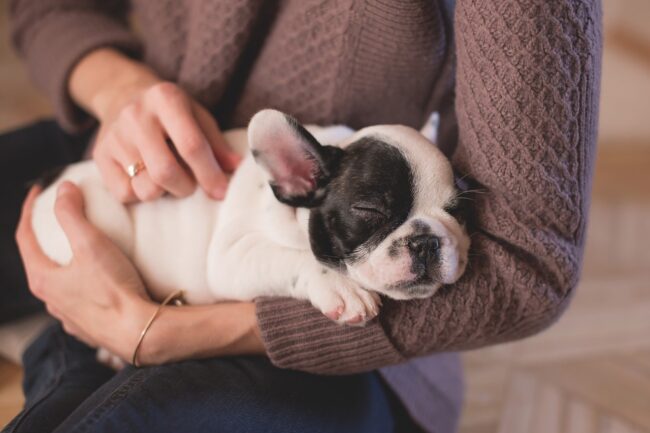Table of Contents
Sleepless nights are one of the most common problems reported by pet owners because when your beloved furry friend doesn’t sleep, you can’t sleep either. Pups can keep you awake with whining, crying, barking, and scratching. There are several reasons a well-trained puppy may experience sleep regression. This problem can be often a concern to parents but can be dealt with in a few simple ways.
In this guide, let us try to understand all you should know about a puppy’s sleep schedule, the possible sleep problems it can experience, and what you can do to avoid and handle such issues.
Puppy Sleep Regression – A Complete Guide
Sleep regression is a common occurrence in puppies and young dogs, particularly when there is a change in their sleep arrangements or schedule. The restlessness generally disappears and the pup starts sleeping through the night as it matures. However, sometimes, the pet can experience sleep regression associated with a serious underlying condition.
Most often, it is just a temporary problem that resolves on its own. For some pets, it is simply an excess of energy that can be addressed by giving the pooch some extra exercise. For others, it is due to environmental changes and resolves once the pup adjusts to them. However, if you feel that your pooch is showing the behavior for longer than usual, it is best to consult a vet who can identify the underlying situation and suggest the best measures.
6 Month Old Puppy Sleep Regression – What You Should Know?
A previously house-trained puppy can, at about 6-7 months of age, start showing strange behaviors. Barking, chewing, dominating and accidents can begin to surface. You may see your pup doing things you haven’t seen doing ever since you brought it home. One of these problems is sleep regression often complained about by parents of 6-month old puppies. While this may be a behavioral issue that can be treated easily, it is important to consider other problems as well.
Pain
Just like human beings, a pup can have restless sleep when it is in pain. Your pooch may be in pain from a medical condition like a dental problem, ear infection, cystitis, or anything else. You can consider visiting your vet to rule out such possibilities. Once the pain is addressed, the pup may start sleeping better.
Anxiety
A stressed, anxious pup finds it difficult to fall asleep. When young puppies are brought to new homes, they experience stress and anxiety living in new surroundings with strange people. Consider taking some measures to make the pooch relaxed and comfortable, so that it can sleep better at night.
Allergies
Itchiness caused by skin problems and allergies can also make it difficult to sleep well. Your pup is likely to suffer from food allergies, dry skin, environmental allergies, or any other type of skin issue, leaving it itchy and uncomfortable. You can work with your vet to determine what is causing allergies and what you can do to relieve them.
Toilet Breaks
Several conditions can cause a change in a pup’s toilet habits and keep it deprived of sleep during the night. Cystitis, kidney problems, diarrhea, and other problems can increase the number of times the dog needs to visit the toilet. If you suspect any such medical condition, you should report it to the vet for timely treatment.
6-Month-Old Puppy Sleep Schedule & How Long Should It Sleep?
Though young pups are energetic and active, they generally sleep a lot through the day and night to ensure healthy growth and sufficient rest. When they are awake, puppies burn a lot of energy as they explore the world around them and grow. A 6-month old puppy should sleep about 14-18 hours a day. This is an average number and some pups can sleep more or less depending on their level of activity and nutrition.
As the surrounding world is so exciting and stimulating for young pups, they often don’t pay attention to their internal clock that tells them it’s time to rest. A sleep schedule is as important as a house training and feeding routine to make sure you and your pet can live peacefully together. If you find that your young pooch is finding it difficult to sleep at night, you can try the following.
Stick to a Schedule
Though it may seem tough, keeping your bedtime and wake times consistent throughout the week helps a lot. Dogs behave the best when they know what they should do at what time. Create a morning, noon, and evening schedule that covers snacks, meals, playtime, walks, naps, and bathroom. Sticking to a schedule as closely as you can will make it easy for the pup to behave as expected.
Schedule Daytime Play Sessions
A growing pet needs some outlet for its boundless energy, so indulge it in interactive games, sports, and dance. If you don’t find time to do this in the daytime, consider a program like a dog camp for it. If the pup gets a lot of mental and physical exercise during the day, it is more likely to settle down and sleep well throughout the night.
Establish Bedtime Routine
When you prioritize routine right from the beginning, the pup learns that nighttime is meant for sleeping. Restrict the pet to food and drink a few hours before bedtime. Take it for a walk at night, play and cuddle for some time, and give it a clue by keeping the place dark and quiet at night.
Do Puppies Sleep More When Teething?
Puppies get their first teeth at about three weeks of age and start losing them when they are around four months old. Apart from this, they get their adult teeth between 4-7 months and are often seen experiencing common teething symptoms. They are in pain during this time and become cranky and fussy. Puppies experience restlessness, excessive chewing, anxiety, and much more when they are teething.
Some pet owners report their pups sleep a bit more when they are going through this period. It is completely normal for a teething puppy to show such behavior. You should understand that it is not feeling well and needs some rest and quiet time. You can give it breaks from training sessions and try to soothe the pain by offering canned food and frozen bone toys. You can also try to relieve pain and inflammation with ice packs. If your pup skips meals too often, becomes lethargic, or shows other serious symptoms, it is best to consult a vet.
Conclusion
Sleep regression in young pups is a serious problem as you lose your valuable night’s sleep from a constantly disturbing pet by your side. While it is quite common, it is best to rule out any underlying conditions by consulting a vet and getting your pooch tested. It can take some time and patience for your new puppy to get accustomed to the household and surrounding and a positive reinforcement training and schedule seems to help. Creating and sticking to a schedule not only rewards your pup and you with a peaceful sleep but also helps develop a bond that lasts a lifetime.

